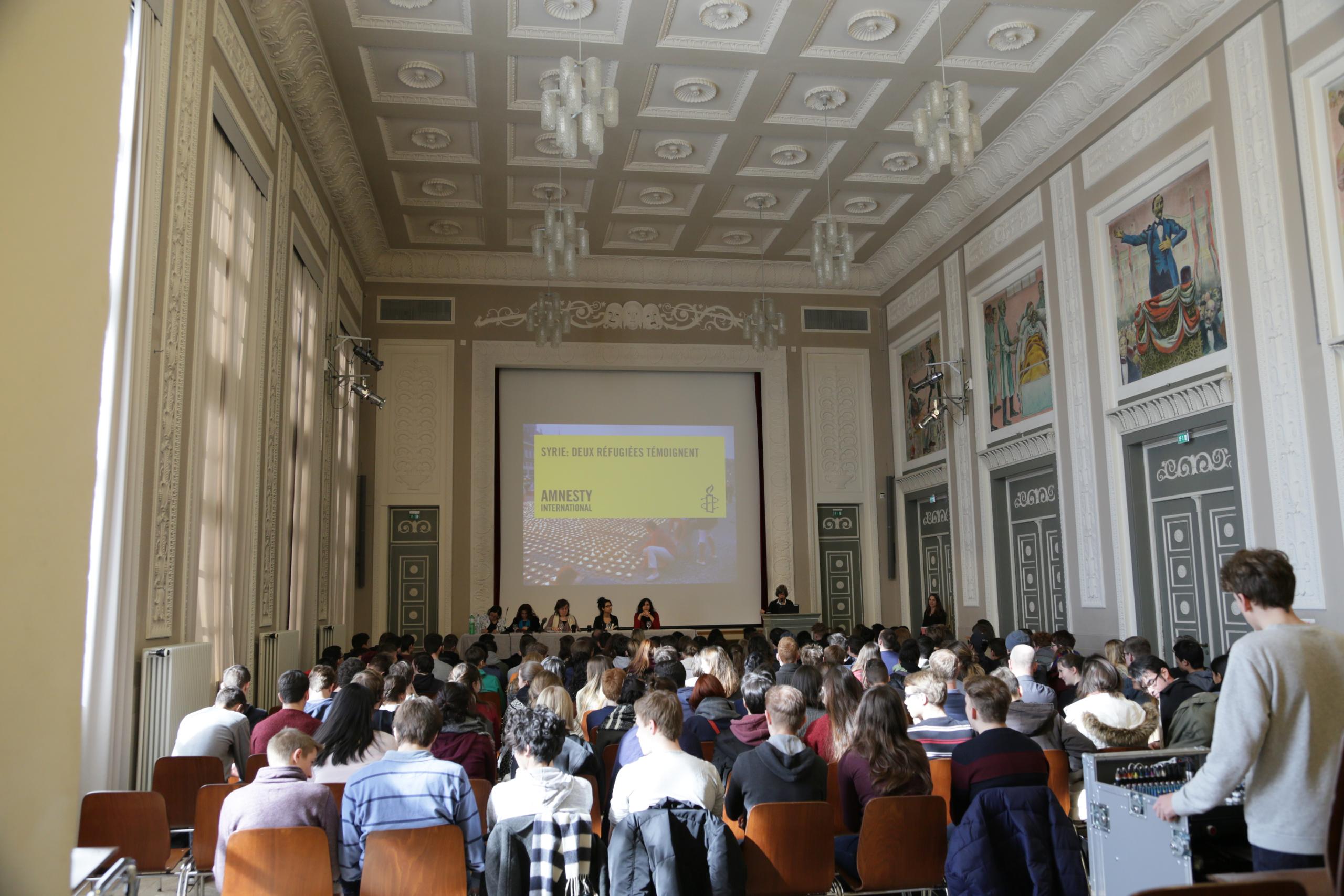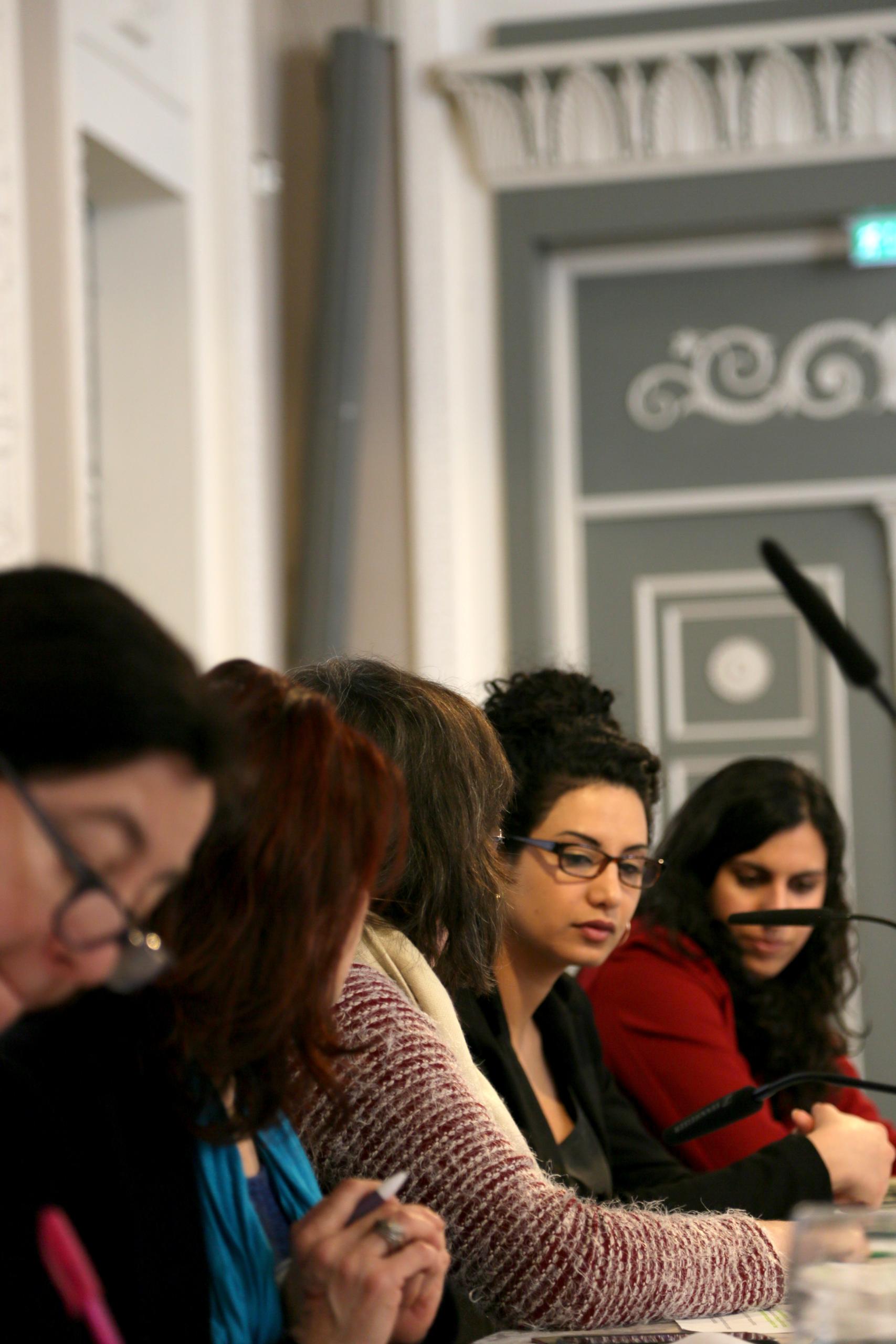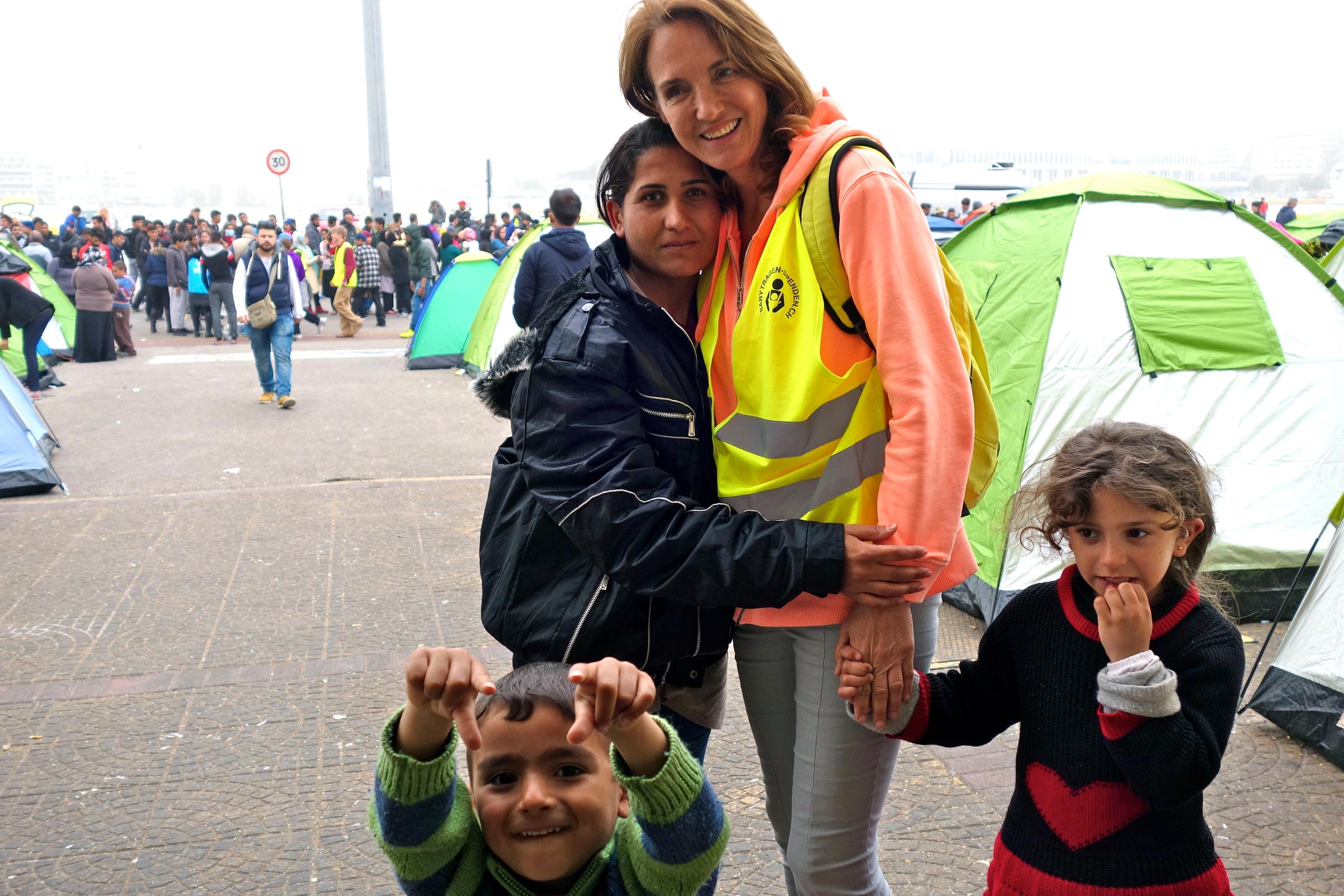Stories of torture in Syria shock Swiss students

Two Syrian refugees have described to Swiss students the brutal torture they suffered while in a Damascus prison, as part of a tour organised by Amnesty International.
Amal Nasr, who has received refuge in Switzerland, and Raneem Ma’touq, a refugee in Germany, gave their testimony recently before secondary school students in Bern.
The tour of Swiss schools and universities marked the fifth year of fighting in Syria.
“Have Syrians always been repressed to such a degree, or has the situation worsened in recent years?” “How many Syrians are persecuted by the ruling regime?” “Are people in Switzerland and Germany friendly towards you?”
Students at the Kirchenfeld school asked these questions at the end of the seminar. Signs of shock were clear on their faces as they listened to the accounts given by the two women through interpreters.
“I was beaten on my back by a torture device called ‘Flying Carpet’. My left foot was broken. My hair was cut with a knife. Cigarettes were put out in my hands. I was lashed with a whip on my back and hands as they beat me. My left hand needed 48 stitches. I bled for three months. I lost my eyesight for three hours, then I was transferred to a hospital where I underwent gynaecological surgery – I don’t know what they did, and I am a virgin.”
This is part of the testimony with which Amal Nasr opened her talk to students. She was not the victim in that case. The victim was a 22-year-old political prisoner in the Adra prison for women in Damascus, one of the largest prisons in the country. She sent a letter to Nasr, a feminist activist who since the 1990s has been defending the rights of women in Syria. She has been arrested several times.
Dream becomes nightmare
Nasr was granted asylum in Switzerland more than a year ago after she had to escape from Syria because the security forces pursued her after she had left prison. She told the young audience that most Syrian women fled their homeland “to protect their children from rape, killing, kidnapping and detention”.
“I left Syria illegally, leaving my only daughter, aged 20, in Damascus to bear the brunt of the dirty war between Islamic State and the regime,” she added.
Fighting back tears as she told the Swiss audience her daughter’s age, Nasr said her daughter had remained in Syria and she cannot now come to Switzerland as Swiss laws do not allow reunions with children over 18.
She explained that the last time she had been detained was because of her involvement in a peace initiative between women supporters and opponents of the Syrian regime. But her dream of peace turned into a nightmare in the Adra prison after she had been charged with terrorism.
She found herself behind bars with about 800 women, “the sisters, mothers or daughters of young men who had to take up arms to confront the regime’s violence”.
“We experienced political detention before the revolution, but the detention after the revolution has been scary,” she said. “We were 12 women in a cell about two metres long and one-and-a-half metres wide. We could neither sleep nor sit. There were girls aged 13 and mothers aged 86 among us. I will never forget the day when a young woman entered the cell and shouted the number of a corpse outside: 15,940.”
The young woman knew the number because many prisoners, young and old, had a number on their back, explained Raneem Ma’touq, who was also detained in Adra prison where she met Nasr, a friend of her parents.
Numbers on backs
“I saw children in the prison with numbers on their backs, and of course the fate of each child or person with a number on their back was death under torture or execution. You can’t believe that those children were terrorists,” said Ma’touq, who took refuge in Germany with her mother and brother about a year ago.
“Around 11 corpses would be carried out of the prison every day, and this was not done right after death: the dead bodies used to stay with the prisoners for several days to the extent that the smell of freedom became associated with the smell of death.”
In a quiet voice, she explained how detainees were often locked away in secret places so no information would be available about them or about where “the worst kinds of torture are practised, women raped and organs of detainees trafficked”.

Speaking about the “crime” that took her to Adra prison, the young university student said: “My activity in Syria was the organisation of peaceful student demonstrations demanding freedom and a civil state. For the regime, our activity was more dangerous than armed groups or the terrorism of the so-called Daesh [Islamic State]. Despite all our peaceful demands for freedom, we were always referred to terrorism courts.”
Raneem Ma’touq’s father Khalil Ma’touq was a lawyer and human rights activist for more than 20 years. He disappeared in October 2012 along with a colleague on their way to their workplace in Damascus. Since then, she has not heard anything about her father. She discovered while she was being investigated that her father had been detained by the Syrian regime, but the regime denies this.
Desire for truth
After the testimonies, it was time to answer the students’ questions and to listen to their comments on what they had heard.
“Repression has been practised in Syria for more than 40 years. There is a school specialising in Syrian repression,” said Nasr.
On the number of citizens being persecuted by the regime, she believes it exceeds 60%, adding that, according to her estimates, “the number of missing people exceeds a quarter of the population”.
As for the kindness and friendliness shown by Swiss and German people, Raneem Ma’touq said “the people of Europe in general are bashful”. She added that her experience in Germany had shown that “the great majority of people want to know what is happening in Syria because the media do not always cover the whole truth”.
Student reaction
“I was deeply affected by their accounts,” a male student told swissinfo.ch. “They provided a lot of information that I was not aware of with regard to the status of women detainees. I was shocked by the numbering of prisoners and the fact that they knew in advance that their inevitable fate would be death.”
A female student was stunned by the 60% figure of the number of citizens being persecuted by the regime. “I was very surprised to know that the family and relatives of people who struggle for democracy were exposed to persecution, and I was shocked because our media hide these sides of the conflict,” she said.
One person expressed her great shock. “I knew that the situation in Syria was horrible, but what the two former detainees said about the conditions in prison is really beyond belief, especially the story of the corpses which stay with the prisoners for days. These things are almost unbelievable here and I feel helpless because I can’t do anything here, or can do just a little while the situation deteriorates there.”
A male student was greatly touched by Raneem Ma’touq’s testimony, as he himself was a refugee from Kosovo. “Such seminars provide a chance to build a realistic picture of asylum for people who have no ties to refugees or foreigners and those who fear refugees.”
Another said: “I’m always touched by such testimonies about things we do not have here in Europe. We cannot imagine what this suffering means to these people. We can just try to understand it. This mother is here, but her daughter is still there in Syria (…). We don’t get the same picture of Syria if we read newspapers or watch TV. So when we listen to testimonies like these, it’s as if we’re discovering a new truth.”
In each seminar, the number of attendees exceeded expectations, sometimes more than double the number.
Amnesty said its goal was to “give Syrians an opportunity to express their suffering, and so that not only what is published in the media about Syria and the governments’ efforts to resolve the refugee crisis is relied on.” Amnesty wanted to highlight the reasons that pushed Syrians to flee their country.
In February 2016, the UN Commission of Inquiry on Syria, which includes former Swiss attorney general Carla Del Ponte, issued a report stating that the mass killing of detainees in Syrian government prisons amounted to the state carrying out an “extermination” policy against the civilian population, which is a crime against humanity.
The independent investigators said in their report that they also documented mass executions and torture of prisoners carried out by two extremist groups – Al-Nusra Front and Islamic State – and these acts amount to war crimes. The report, titled “Out of Sight, Out of Mind: Deaths in DetentionExternal link“, covers the period from March 10, 2011, to November 30, 2015. It is based on interviews with 621 survivors and witnesses and pieces of evidence.
There was no response from the Syrian government and it rejected the content of similar reports in the past.
(Source: news agencies)
Adapted from Arabic by Mohamed Ibrahim

In compliance with the JTI standards
More: SWI swissinfo.ch certified by the Journalism Trust Initiative











You can find an overview of ongoing debates with our journalists here . Please join us!
If you want to start a conversation about a topic raised in this article or want to report factual errors, email us at english@swissinfo.ch.